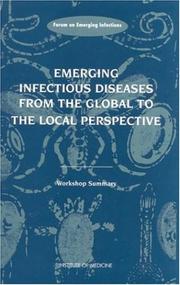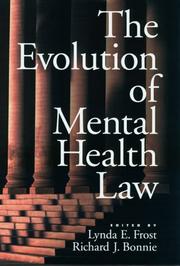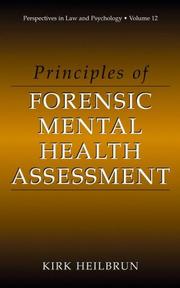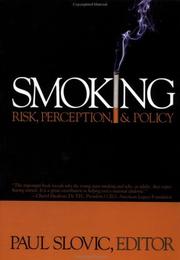| Listing 1 - 10 of 26 | << page >> |
Sort by
|

ISBN: 0309071844 0309564824 9780309564823 9780309071840 0309171105 9780309171106 Year: 2001 Publisher: Washington, D.C. National Academy Press
Abstract | Keywords | Export | Availability | Bookmark
 Loading...
Loading...Choose an application
- Reference Manager
- EndNote
- RefWorks (Direct export to RefWorks)
Public Policy --- Communicable Diseases --- Social Control Policies --- Infection --- Policy --- Social Control, Formal --- Bacterial Infections and Mycoses --- Health Care Economics and Organizations --- Diseases --- Social Sciences --- Sociology --- Health Care --- Anthropology, Education, Sociology and Social Phenomena --- Health Policy --- Communicable Diseases, Emerging --- Emerging infectious diseases --- Medical geography --- World health --- Epidemiology --- Emerging infections --- New infectious diseases --- Re-emerging infectious diseases --- Reemerging infectious diseases --- Communicable diseases
Book
ISBN: 2749229731 Year: 2001 Publisher: Toulouse (33 avenue Marcel Dassault 31500) : ERES,
Abstract | Keywords | Export | Availability | Bookmark
 Loading...
Loading...Choose an application
- Reference Manager
- EndNote
- RefWorks (Direct export to RefWorks)
Le terme advocacy (mot anglais) désigne un mode d'aide à l'expression de personnes qui s'estiment victimes d'un préjudice, qui se sentent mal écoutées et insuffisamment respectées par leurs interlocuteurs institutionnels, ou qui rencontrent des obstacles à l'exercice de leur pleine citoyenneté. Il s'agit d'une pratique de médiation sociale qui introduit un tiers, amplifiant la demande du patient usager, sans parler à sa place, et qui permet ainsi aux différents points de vue de trouver un ajustement dans un dialogue respectueux. L'association Advocacy-France a pour but de soutenir toutes les formes de recours dans les situations d'exclusion, de ségrégation, de mesures privatives de liberté individuelle. Composée d'usagers et de professionnels de la santé mentale, elle développe des actions collectives, coopératives et solidaires entre tous les acteurs engagés, aussi différents soient-ils, dans leurs statuts ou leur expérience. Dans l'Europe du nord, la pratique de l'advocacy s'est largement développée depuis une dizaine d'années, sous des formes très variées, à travers les collectifs d'usagers ou par l'intermédiaire d'une personne advocate, ou de l'ombudsman. En France, où le stigmate de la maladie mentale est aussi fort et la tradition paternaliste du soin aussi dominante, son introduction semblait une gageure. Les auteurs exposent ici leurs actions concrètes, leurs combats pour convaincre de la crédibilité des objectifs et des moyens mis en oeuvre par l'association.
Health Services --- Social Environment --- Social Control, Formal --- Behavioral Disciplines and Activities --- Psychiatry and Psychology --- Health Care Facilities, Manpower, and Services --- Health Care Economics and Organizations --- Sociology --- Social Sciences --- Health Care --- Anthropology, Education, Sociology and Social Phenomena --- Mental Health Services --- Social Support --- Patient Advocacy

ISBN: 1557987459 Year: 2001 Publisher: [Place of publication not identified] American Psychological Association
Abstract | Keywords | Export | Availability | Bookmark
 Loading...
Loading...Choose an application
- Reference Manager
- EndNote
- RefWorks (Direct export to RefWorks)
Mental health laws --- Insanity (Law) --- Mentally ill --- Mentally ill offenders --- Mentally Disabled Persons --- Mental Health Services --- Commitment of Mentally Ill --- Professional Autonomy --- Forensic Psychiatry --- Health Services --- Disabled Persons --- Professional Practice --- Behavioral Disciplines and Activities --- Jurisprudence --- Persons --- Organization and Administration --- Psychiatry --- Health Care Facilities, Manpower, and Services --- Psychiatry and Psychology --- Behavioral Sciences --- Health Care --- Health Services Administration --- Named Groups --- Social Control, Formal --- Health Care Economics and Organizations --- Medical & Hospital Legislation - U.S. --- Law - U.S. --- Law, Politics & Government --- Commitment and detention
Periodical
ISSN: 15302415 15297489 Year: 2001 Publisher: [Malden, MA] : Blackwell Publishers,
Abstract | Keywords | Export | Availability | Bookmark
 Loading...
Loading...Choose an application
- Reference Manager
- EndNote
- RefWorks (Direct export to RefWorks)
Social policy --- Social psychology --- Problèmes sociaux --- Politique publique --- Psychological aspects --- Social psychology. --- Analyse sociale. --- Politique publique. --- Problèmes sociaux. --- Public Policy. --- Psychology, Social. --- Psychological aspects. --- Public Policy & Administration. --- Social Psychology. --- Social Psychology --- Psychologies, Social --- Social Psychologies --- Migration Policy --- Population Policy --- Social Protection --- Social Policy --- Migration Policies --- Policies, Migration --- Policies, Population --- Policies, Public --- Policies, Social --- Policy, Migration --- Policy, Population --- Policy, Public --- Policy, Social --- Population Policies --- Protection, Social --- Public Policies --- Social Policies --- Mass psychology --- Psychology, Social --- National planning --- State planning --- Human ecology --- Psychology --- Social groups --- Sociology --- Policy Making --- Social Control, Formal --- Economic policy --- Family policy --- Social history --- Psychology, Perceptual --- Perceptual Psychology --- Affirmative Action --- Action, Affirmative --- Social Sciences - General --- Psicologia social --- Política social
Periodical
Abstract | Keywords | Export | Availability | Bookmark
 Loading...
Loading...Choose an application
- Reference Manager
- EndNote
- RefWorks (Direct export to RefWorks)
Nutrition --- Nutrition policy --- Food supply --- Public Policy. --- Food supply. --- Nutrition. --- Nutrition policy. --- Africa. --- Food --- Food policy --- Nutrition and state --- State and nutrition --- Social policy --- Alimentation --- Health --- Physiology --- Diet --- Dietetics --- Digestion --- Food habits --- Malnutrition --- Food control --- Produce trade --- Agriculture --- Food security --- Single cell proteins --- Affirmative Action --- Migration Policy --- Population Policy --- Social Protection --- Social Policy --- Action, Affirmative --- Migration Policies --- Policies, Migration --- Policies, Population --- Policies, Public --- Policies, Social --- Policy, Migration --- Policy, Population --- Policy, Public --- Policy, Social --- Population Policies --- Protection, Social --- Public Policies --- Social Policies --- Policy Making --- Social Control, Formal --- Government policy --- Health aspects --- Eastern Hemisphere --- Public Policy --- Africa
Book
ISBN: 1598752553 Year: 2001 Publisher: Santa Monica : RAND Corporation,
Abstract | Keywords | Export | Availability | Bookmark
 Loading...
Loading...Choose an application
- Reference Manager
- EndNote
- RefWorks (Direct export to RefWorks)
A review of involuntary outpatient treatment in the USA. It examines the experience of eight states, including interviews with attorneys, psychiatrists and public officials. It also analyzes administrative data for all persons served by California's county contract mental health agencies.
Community mental health services. --- Community mental health services - United States. --- Involuntary treatment. --- Involuntary treatment - United States. --- Mental health laws. --- Mentally ill. --- Psychiatric hospitals. --- Psychiatric hospitals - United States. --- Psychiatric hospitals --- Involuntary treatment --- Community mental health services --- Mentally ill --- Mental health laws --- Forensic Psychiatry --- Health Services --- Social Control, Formal --- Behavioral Disciplines and Activities --- Patients --- Evaluation Studies as Topic --- Health Care Evaluation Mechanisms --- Social Control, Informal --- Quality of Health Care --- Commitment of Mentally Ill --- Mental Health Services --- Coercion --- Program Evaluation --- Outpatients --- Health Care Facilities, Manpower, and Services --- Sociology --- Psychiatry --- Health Services Administration --- Psychology --- Investigative Techniques --- Persons --- Jurisprudence --- Behavioral Sciences --- Health Care --- Health Care Quality, Access, and Evaluation --- Social Sciences --- Health Care Economics and Organizations --- Care

ISBN: 1557987467 Year: 2001 Publisher: Washington, D.C. : American Psychological Association,
Abstract | Keywords | Export | Availability | Bookmark
 Loading...
Loading...Choose an application
- Reference Manager
- EndNote
- RefWorks (Direct export to RefWorks)
Mental health laws --- Insanity (Law) --- Forensic psychiatry --- Mental health laws --- Insanity (Law) --- Forensic psychiatry --- Mental Health Services --- Forensic Psychiatry --- Mental Competency --- Mental Disorders --- Mentally Disabled Persons --- Legislation, Medical --- Patient Rights --- Legislation as Topic --- Disabled Persons --- Jurisprudence --- Human Rights --- Behavioral Disciplines and Activities --- Psychiatry --- Behavior and Behavior Mechanisms --- Psychiatry and Psychology --- Psychological Phenomena and Processes --- Health Services --- Forensic Medicine --- Health Care Facilities, Manpower, and Services --- Social Control, Formal --- Forensic Sciences --- Persons --- Behavioral Sciences --- Medicine --- Health Care Economics and Organizations --- Health Care --- Criminology --- Sociology --- Health Occupations --- Named Groups --- Social Sciences --- Disciplines and Occupations --- Anthropology, Education, Sociology and Social Phenomena --- Medical & Hospital Legislation - U.S. --- Law - U.S. --- Law, Politics & Government

ISBN: 1557986819 Year: 2001 Publisher: [Place of publication not identified] American Psychological Association
Abstract | Keywords | Export | Availability | Bookmark
 Loading...
Loading...Choose an application
- Reference Manager
- EndNote
- RefWorks (Direct export to RefWorks)
Discrimination against the mentally ill --- Mental health laws --- Licensure --- Prejudice --- Psychiatry --- Public Policy --- Education, Professional --- Federal Government --- Civil Rights --- Mental Health Services --- Insurance, Health --- Credentialing --- Social Control Policies --- Human Rights --- Medicine --- Health Services --- Government --- Behavioral Sciences --- Education --- Behavioral Disciplines and Activities --- Insurance --- Psychology, Social --- Health Care Facilities, Manpower, and Services --- Health Occupations --- Social Control, Formal --- Psychiatry and Psychology --- Organizations --- Policy --- Quality Assurance, Health Care --- Anthropology, Education, Sociology and Social Phenomena --- Social Sciences --- Financing, Organized --- Behavior and Behavior Mechanisms --- Sociology --- Health Care Quality, Access, and Evaluation --- Health Care Economics and Organizations --- Health Care --- Disciplines and Occupations --- Economics --- Disabled Legislation - U.S. --- Law - U.S. --- Law, Politics & Government --- Law and legislation --- United States.

ISBN: 0306473828 0306465388 Year: 2001 Publisher: New York : Kluwer Academic/Plenum Publishers,
Abstract | Keywords | Export | Availability | Bookmark
 Loading...
Loading...Choose an application
- Reference Manager
- EndNote
- RefWorks (Direct export to RefWorks)
Most of the literature in forensic mental health assessment is organized around the particular legal issue that is the focus of a given assessment, tool, or research study. This book starts with a different assumption: There are broad principles of forensic assessment that are applicable across different legal issues. If such principles exist, they should be derived from and supported by sources of authority in ethics, law, science, and prof- sional practice. This is what I seek to do in this book, with each of the 29 broad principles of forensic mental health assessment described and a- lyzed from the perspective of these sources of authority. There are a number of individuals who have contributed in various ways to making this a better book. It seems best to begin with a general acknowledgment: Those interested in forensic mental health assessment, particularly my colleagues from the American Psychology–Law Society and the American Board of Forensic Psychology, have been an extraor- narily helpful and congenial group. I have learned a great deal from them over the years and they challenged me to undertake the daunting task of trying to capture the broad views of the field in this book.
Evidence, Expert. --- Forensic psychology. --- Mental illness -- Diagnosis. --- Forensic psychology --- Mental illness --- Evidence, Expert --- Expert Testimony --- Forensic Psychiatry --- Personality Assessment --- Psychiatry --- Jurisprudence --- Behavioral Disciplines and Activities --- Forensic Medicine --- Psychiatry and Psychology --- Medicine --- Social Control, Formal --- Forensic Sciences --- Behavioral Sciences --- Health Care Economics and Organizations --- Sociology --- Criminology --- Health Occupations --- Health Care --- Disciplines and Occupations --- Social Sciences --- Anthropology, Education, Sociology and Social Phenomena --- Legal & Forensic Medicine --- Public Health --- Health & Biological Sciences --- Diagnosis --- Diagnosis. --- Psychology. --- Psychiatry. --- Clinical psychology. --- Law and Psychology. --- Clinical Psychology. --- Criminology and Criminal Justice, general. --- Psychiatric diagnosis --- Juridical psychology --- Juristic psychology --- Legal psychology --- Psychology, Forensic --- Expert evidence --- Expert testimony --- Expert witness --- Expert witnesses --- Opinion evidence --- Scientific evidence (Law) --- Law --- Psychology, clinical. --- Criminology. --- Psychological aspects. --- Psychodiagnostics --- Forensic sciences --- Psychology, Applied --- Evidence (Law) --- Witnesses --- Crime --- Social sciences --- Criminals --- Medicine and psychology --- Mental health --- Psychology, Pathological --- Psychological tests --- Behavioral sciences --- Mental philosophy --- Mind --- Science, Mental --- Human biology --- Philosophy --- Soul --- Study and teaching

ISBN: 0761923802 0761923810 1452232652 1322416656 1452267014 9781452267012 9781452232652 9780761923817 9780761923800 9781322416656 Year: 2001 Publisher: Thousand Oaks, CA Sage Publications
Abstract | Keywords | Export | Availability | Bookmark
 Loading...
Loading...Choose an application
- Reference Manager
- EndNote
- RefWorks (Direct export to RefWorks)
The basis for this study are two extensive telephone surveys (designed by Slovic and the other contributors to this volume) that were conducted between 1999- 2000, recording the responses of over 4000 people.
Smoking --- Nicotine --- Cigarette smokers --- Risk perception --- Health aspects --- Attitudes --- Health risk assessment --- Government policy --- Cigarette smokers - Attitudes. --- Nicotine - Health aspects. --- Smoking - Health aspects. --- Delivery of Health Care --- Public Policy --- Behavior --- Communication --- Solanaceous Alkaloids --- Attitude --- Pyridines --- Marketing --- Habits --- Social Control Policies --- Information Science --- Commerce --- Behavior and Behavior Mechanisms --- Heterocyclic Compounds, 1-Ring --- Alkaloids --- Health Care Quality, Access, and Evaluation --- Heterocyclic Compounds --- Policy --- Psychiatry and Psychology --- Health Care --- Social Control, Formal --- Technology, Industry, and Agriculture --- Health Care Economics and Organizations --- Chemicals and Drugs --- Social Sciences --- Sociology --- Technology, Industry, Agriculture --- Anthropology, Education, Sociology and Social Phenomena --- Attitude to Health --- Health Policy --- Risk-Taking --- Advertising as Topic --- Psychiatry --- Health & Biological Sciences --- Substance Abuse Disorders --- Risk perception. --- Health aspects. --- Attitudes. --- Health risk assessment. --- Government policy. --- Cigarette habit --- Cigarette smoking --- Tobacco smoking --- Awareness, Risk --- Risk awareness --- Smokers, Cigarette --- Tobacco use --- Perception --- Persons --- Pyridine --- Tobacco --- Tobacco products --- Smoking - Health aspects --- Nicotine - Health aspects --- Cigarette smokers - Attitudes --- Cigarette smokers - Health risk assessment --- Smoking - Government policy
| Listing 1 - 10 of 26 | << page >> |
Sort by
|

 Search
Search Feedback
Feedback About UniCat
About UniCat  Help
Help News
News